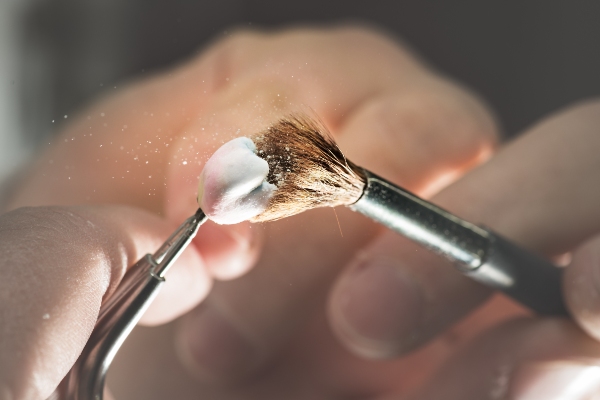What is the Purpose of Dental Crowns?

Dental crowns are protective covers or caps that fit over the visible portion of teeth. Over time, teeth endure damage from injuries, tooth decay and other wear and tear. Teeth might become misshapen, cracked, or decayed. Professionals cement the crown atop the tooth to restore its strength, appearance, and size.
Crowns may consist of various materials, including metal, ceramic, porcelain, resin, or a combination of metal and other materials. However, most crowns are tooth-colored and blend in with surrounding natural teeth.
How do dentists apply dental crowns?
The dentist needs to examine the patient's mouth to apply dental crowns. Generally, the process should take multiple visits. First, your dentist will perform x-rays to analyze the tooth and the bone. If you have tooth decay, infection, or injury to the tooth's pulp, you may require a root canal before fitting your crown.
A dentist prepares a tooth for a crown by taking an impression of a patient's mouth. The resulting model shows how the teeth fit together and guide the crown's scale, proportions, and fit. Next, the dentist files down the natural tooth. This ensures the cap does not extend beyond the line of surrounding teeth. Finally, the dentist takes another impression to produce the crown and confirm its proper fit before the dentist cements it onto a tooth.
When do dentists recommend crowns?
Dental crowns are a standard treatment option in modern dentistry. Dentists usually recommend crowns for various purposes when restoring natural teeth or protecting them from future damage.
Protection against infection
Cracks, chips, and breaks can make a tooth vulnerable to infection by creating passageways that allow bacteria in plaque and tartar to enter its internal structure. Bacteria can wear away the jawbone and destabilize teeth. A crown creates a protective barrier that covers openings and keeps out bacteria.
Strengthening of weak teeth
Dentists may recommend crowns to protect weak teeth. For example, when a dentist drills away significant portions of a natural tooth to accommodate a large filling, a dental crown provides reinforcement. This helps to avert damage while retaining the tooth's function. In addition, dental crowns reduce infection risk and sensitivity for teeth missing outer layers of enamel.
Crowns can handle the wear and tear better than your natural teeth. However, to maintain their strength and longevity, you should protect the underlying tooth from gum disease or decay. Continue your normal oral hygiene practices and brush and floss at least twice daily.
Support following root canal therapy
During a root canal procedure, the dentist typically must drill through a tooth to access and clean an infected root. The drilling removes a significant portion of the natural tooth, which may already be compromised by the infection. Although a dentist fills the resulting opening, a crown is usually necessary to strengthen the weakened tooth and prevent subsequent infections.
Function following a dental implant
A titanium implant in the jawbone replaces a tooth's root following its extraction and attaches to an abutment that extends through the gum. A dental crown attaches to the abutment, replacing the natural tooth's visible portion and restoring its function.
Attachment of bridges
Dental crowns help support traditional bridges that fill gaps where teeth are missing. A dentist crowns the natural teeth on either side of the space to provide a stable base that adequately secures the prosthetic teeth of the bridge, allowing them to withstand the force of chewing.
Covering misshapen or discolored teeth
Porcelain crowns are a popular choice for covering front teeth showing signs of wear or discoloration. While misshapen teeth may cause issues with your bite, they can also cause you to lose confidence in your smile. Imperfections can limit people's lives because they tend to hide their smiles and avoid contact with other people.
Crowns, on the other hand, hide imperfections. They are stain-resistant and shaped like natural teeth to produce a uniform and bright smile while protecting underlying teeth.
Conclusion
Dental crowns are a versatile option for treating damaged, weak, or unattractive teeth. Before placing the crown, dentists will take x-rays of your teeth and perform any necessary dental procedures, such as root canals. Following the procedure, the dentist takes impressions of your teeth to create crowns that fit your mouth.
Crowns are porcelain, metal, or ceramic covers that protect teeth from further damage. Crowns are not susceptible to damage or decay like natural teeth. If you practice good oral hygiene, your crowns should function correctly for many years.
Request an appointment here: https://www.casasadobesdentistry.com or call Casas Adobes Dentistry at (520) 365-0559 for an appointment in our Tucson office.
Check out what others are saying about our dental services on Google: Dental Crowns and Dental Bridges in Tucson, AZ.
Recent Posts
Dental crowns and veneers can both restore the function and appearance of damaged teeth. That damage can take the form of decay, discoloration, chips or cracks, or a crooked appearance. The main difference is that a crown goes over the whole tooth, whereas a veneer only sits on the front. Beyond that, there are pros…
A dental crown is usually chosen as the restoration for a tooth after it has undergone a root canal procedure. Root canal therapy involves removing the soft tissues in a tooth’s pulp chamber to prevent or treat infections.Root canals enable dentists to save extremely damaged or infected teeth. The procedure has a high success rate,…
A porcelain dental crown is beautiful and luminescent and reflects light just enough to look like a natural tooth. Although porcelain crowns look natural, they are, in fact, artificial. Crowns can be shaped precisely in order to restore tooth damage and enhance your smile. This makes them very beneficial both physically and aesthetically.A crown can…
When a person is missing one or more teeth but does not need a full set of dentures, dental bridges may be recommended to take the place of the lost teeth. The number of teeth that a dental bridge replaces may depend on several factors.Dental bridges consist of two or more crowns that attach to…


